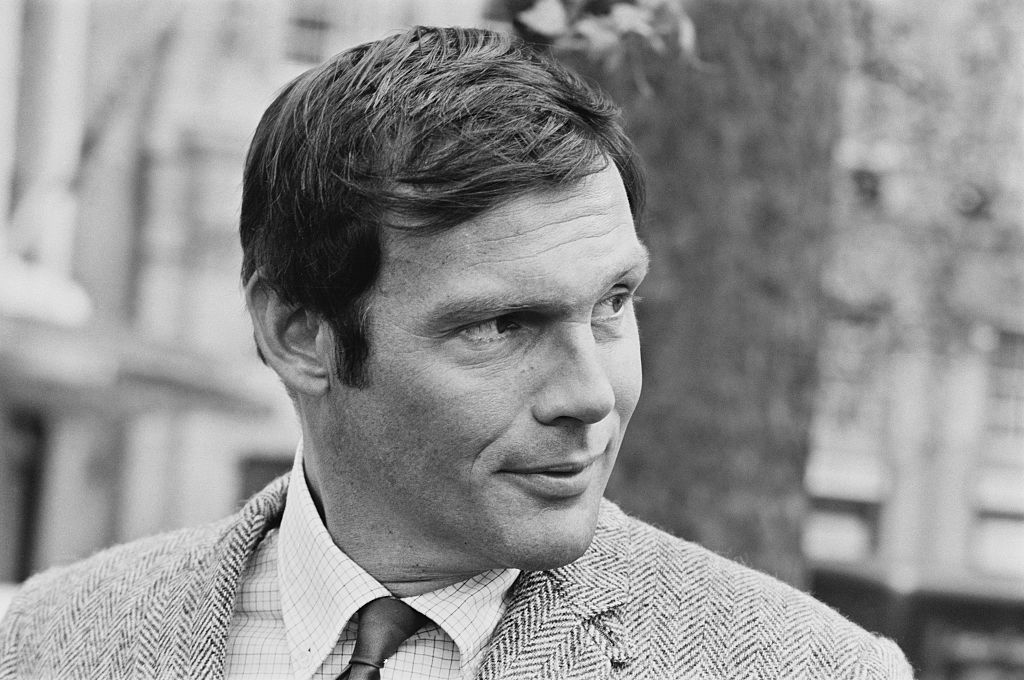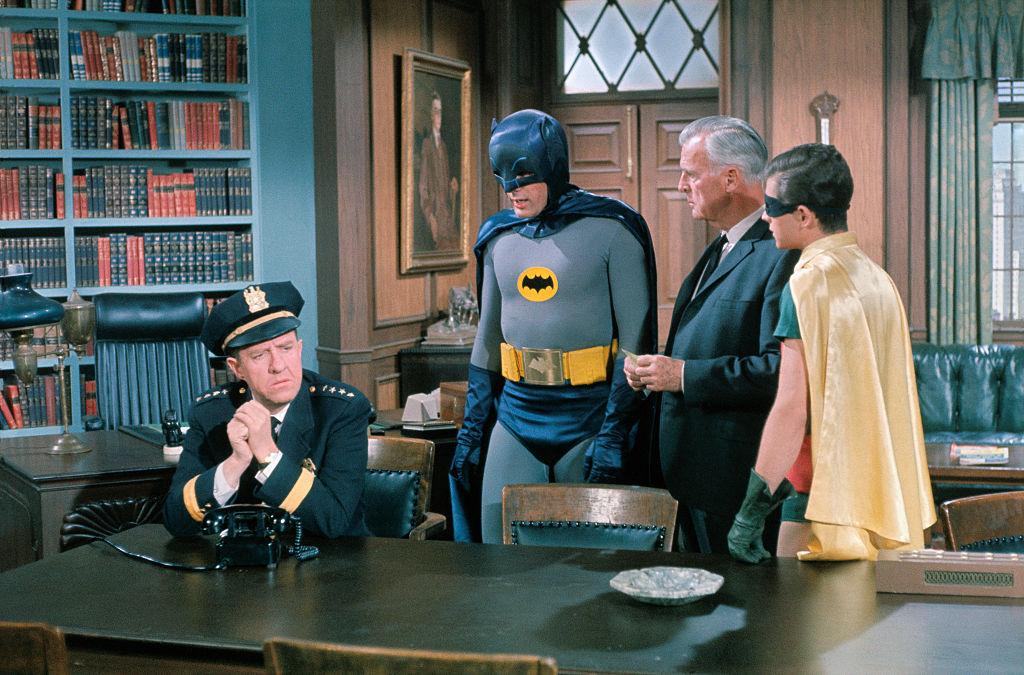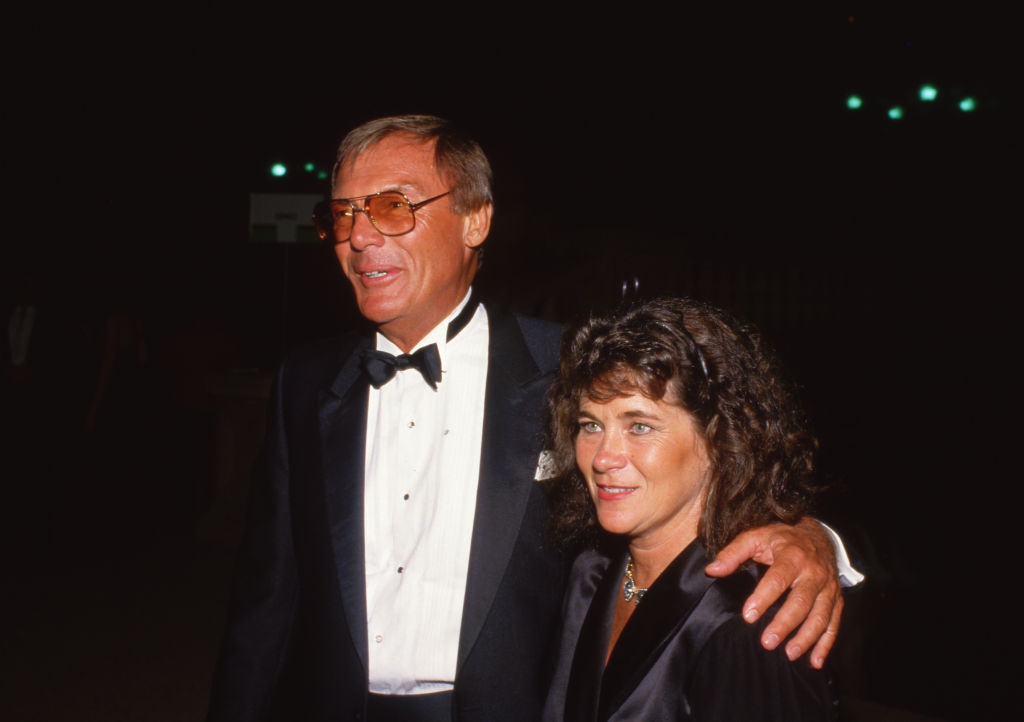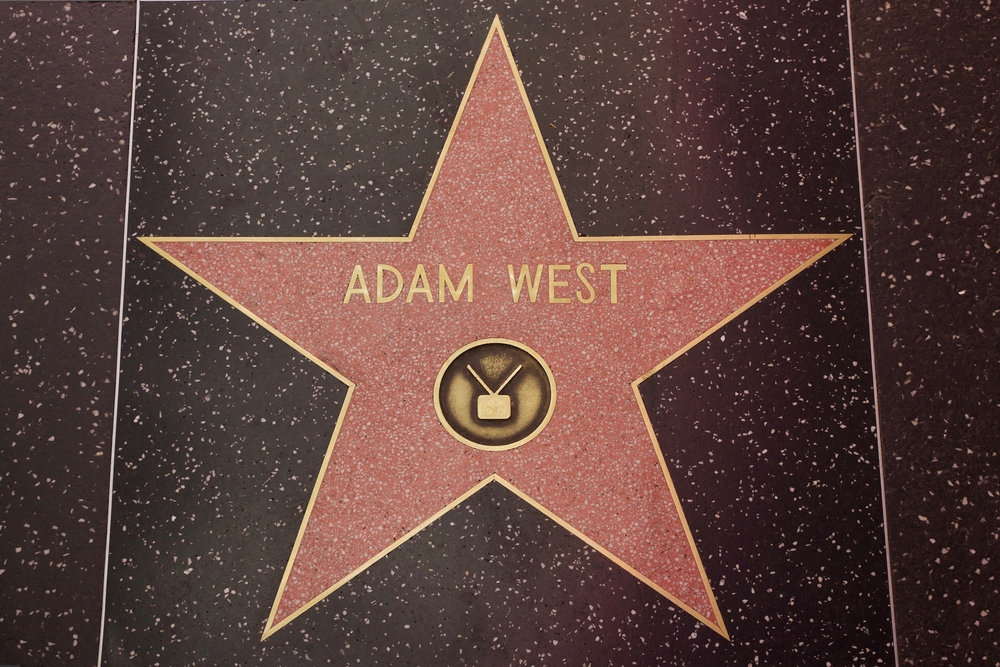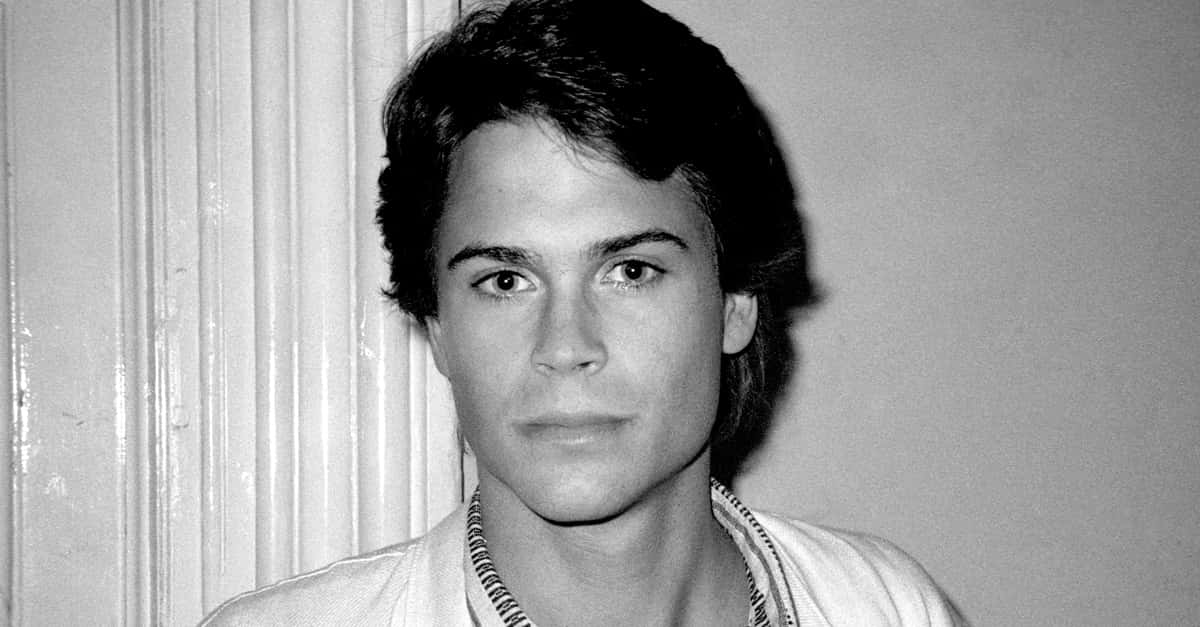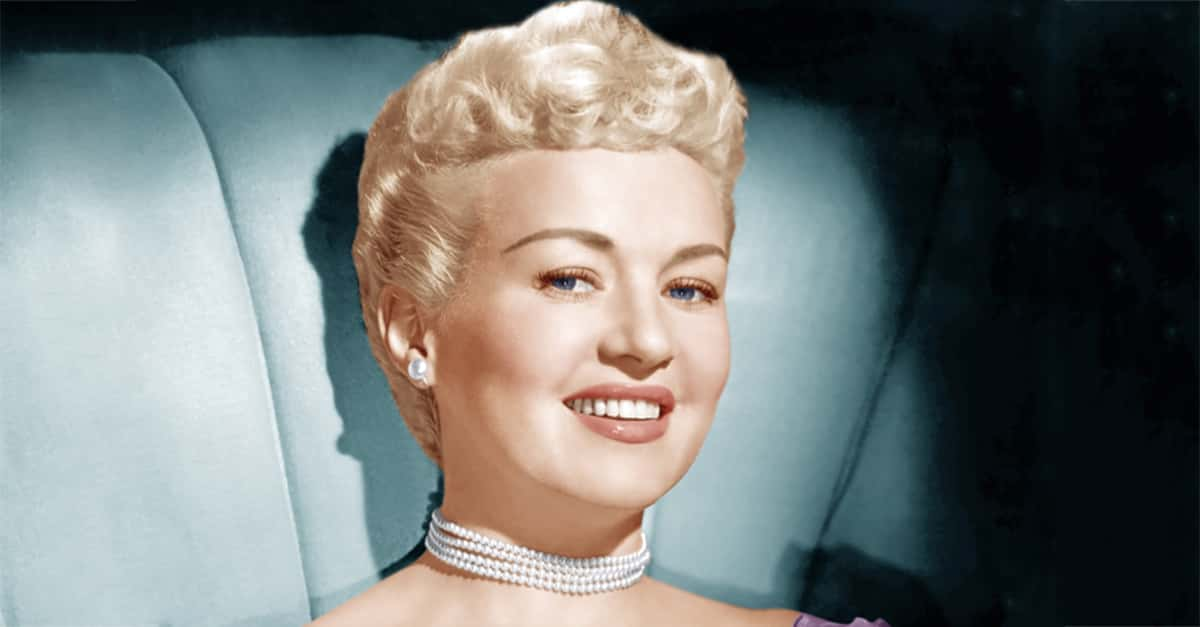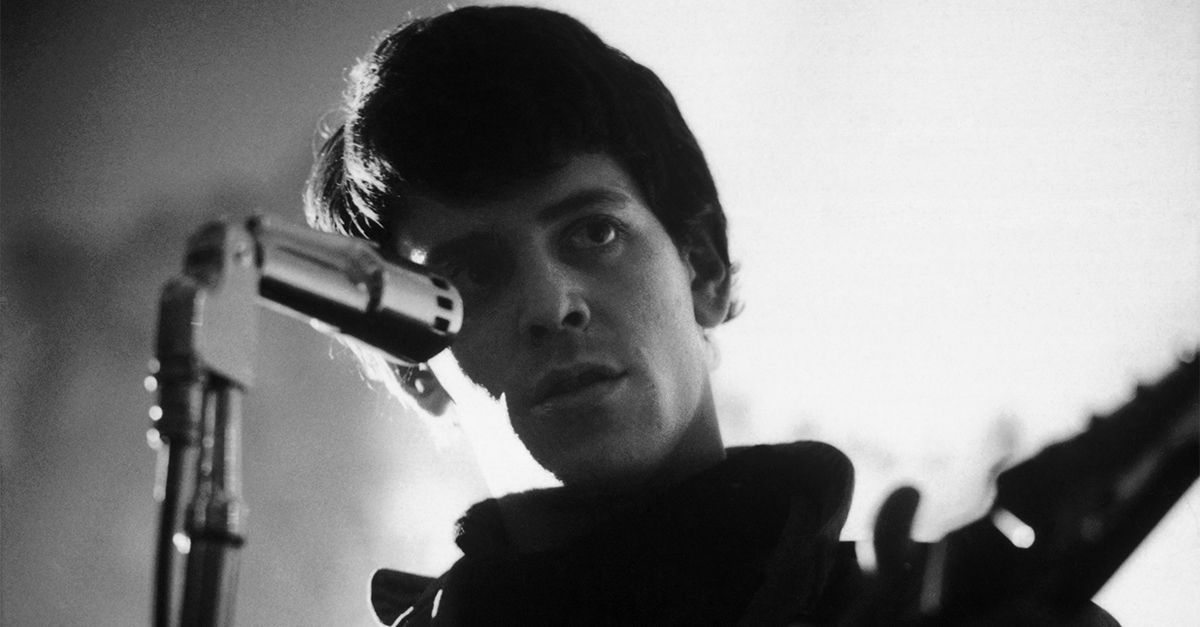He Was A Bright Knight
Adam West rose to superstardom as TV’s Batman. However, once he donned the mask and cape, he would never be able to take them off again. Fortunately, he learned that his real superpower was bringing joy to millions of fans—and ruthlessly parodying himself.
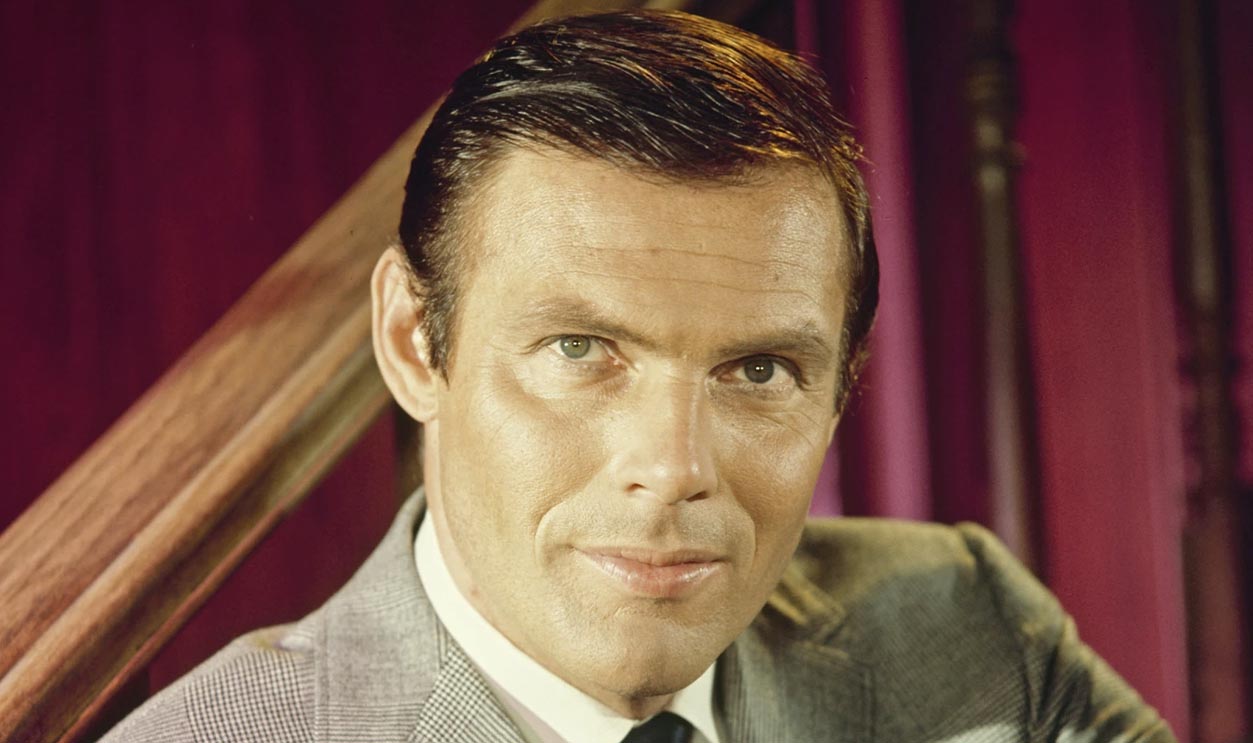
1. He Was Not Born In A Bat Cave
William West Anderson (aka Adam West) was not born in a bat cave. He was born in Walla Walla, Washington in September of 1928 to Otto Anderson, a hard-working farmer, and his wife, Audrey Volenne. His mother was a retired opera singer and concert pianist who had abandoned her own dreams of fame and fortune to raise her family.
From an early age, West was determined to follow in his mother’s footsteps—literally.
 Mondadori Portfolio, Getty Images
Mondadori Portfolio, Getty Images
2. He Wanted To Go To Hollywood
For little West, life in Walla Walla, Washington didn’t offer much and he dreamed of a life beyond his family’s farm. In fact, when he was still young, he told his father that once he was finished with his education, he would point his feet in the direction of Hollywood. Sadly, tragedy struck before he was done with school.
3. He Stayed With His Mother
West’s quiet and calm childhood was turned upside down. When he was just 15 years old, his parents filed for divorce. However, West saw it as an opportunity to get one step closer to his dream. Instead of staying with his father on the farm, he followed his mother to Seattle where he prepared himself for a brighter future.
 NBC Television, Wikimedia Commons
NBC Television, Wikimedia Commons
4. He Was An A-Student
Despite his previous pronouncement to his father about taking off for Hollywood right after school, West did the responsible thing. After graduating high school, he went to Whitman College to pursue a formal education. Turns out, he was pretty bright. West graduated with a degree in literature and a minor in psychology. He wasn’t just an A-student, though.
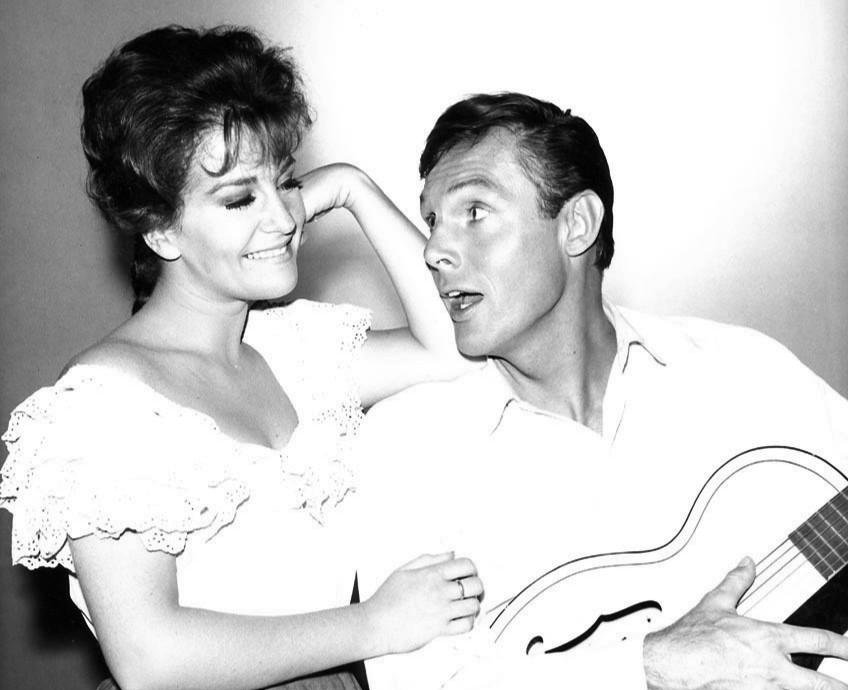 NBC Television, Wikimedia Commons
NBC Television, Wikimedia Commons
5. He Was A Frat Boy And Debater
West hadn’t given up on his dream of going to Hollywood. While at Whitman College, he became a member of a fraternity and honed his unique and emotive voice as part of the speech and debate teams. He had no way of knowing at the time that he was actually preparing himself for life’s next big curveball.
 Gage Skidmore, CC BY-SA 3.0, Wikimedia Commons
Gage Skidmore, CC BY-SA 3.0, Wikimedia Commons
6. He Surfed The Airwaves
Not long after graduating from Whitman College, West got the first casting call of his life—though, not the kind he wanted. The US government drafted West during the Korean War, where he served in the US Army. Though, thankfully, not on the front lines. Instead, he put his distinctive voice to use as an announcer for the American Forces Network, broadcasting overseas.
His next job was an even stranger one.
7. He Delivered More Than Lines
After completing his service with the US Army, West didn’t march straight to Hollywood. Instead, he took yet another (humble) detour. He worked as a milkman, delivering bottles door to door. It wasn’t glamorous, but it paid the bills. And he was delivering the milk in more ways than one.
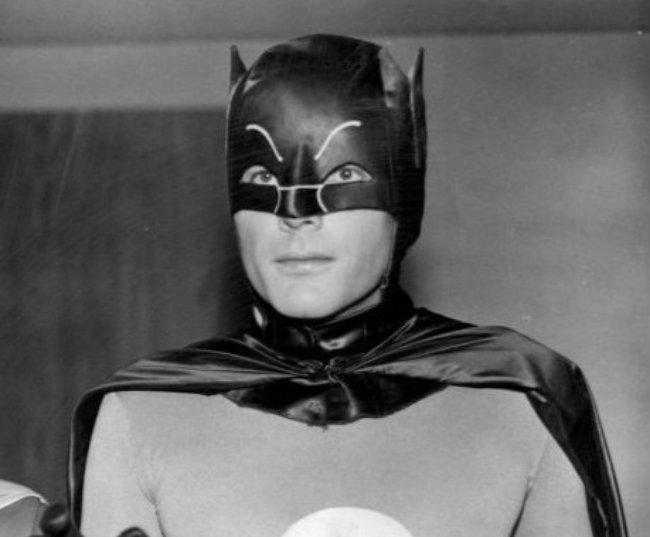 Greenway Productions, Wikimedia Commons
Greenway Productions, Wikimedia Commons
8. He Got Hitched Young
West’s first major role wasn’t on screen—it was as a husband. In 1950, while still in college, he married his sweetheart, Billie Lou Yeager. But young love didn’t last. After six years, the couple divorced, and West set his sights on the future and the illusive dream he still wanted to chase.
 ABC Television, Wikimedia Commons
ABC Television, Wikimedia Commons
9. He Moved To The Middle Of The Pacific
After the end of his first marriage, West took a leap of faith…halfway across the Pacific Ocean. He moved to Hawaii to chase his dream of working in television. It may not have been Hollywood, but it was the perfect place for him to learn the ins and outs of the industry. If he survived, that is.
 ovoviviparous, CC BY-SA 2.0, Wikimedia Commons
ovoviviparous, CC BY-SA 2.0, Wikimedia Commons
10. He Was The Original Castaway
One of West’s first official (albeit uncredited) roles was as a radio operator in 1957’s Voodoo Island. It was also—almost—his last role. According to his autobiography, after a full day of filming, the crew packed up their gear and went back to the mainland…without him. West was stuck on the island alone overnight. Thankfully, the only real voodoo was his good luck.
 Alan Light, CC BY 2.0, Wikimedia Commons
Alan Light, CC BY 2.0, Wikimedia Commons
11. He Hung Out With A Chimp
West made it back from the deserted island to land his first real gig in the Hawaiian television show The Kini Popo Show. In the kids’ show, he starred alongside a chimpanzee named Peaches before taking over as host of the series. It seemed like everything was falling into place.
12. He Found Love Again
West’s time in Hawaii offered him more than just a career—it gave him a second chance at love. While building his budding television career in the mid-Pacific island, West also built a new life. In 1957, he married Ngatokorua Frisbie Dawson, a Cook Island dancer who performed with the Puka Puka Otea troupe. Still, Hollywood remained his dream.
13. He Became Adam West
With a wife and children in tow, West left Hawaii behind in 1959 and made the bold move he had always dreamed of: Hollywood. Once there, he traded in his given name, William Anderson, for the more marquee-friendly “Adam West”. He might as well have called himself “Adam Western”.
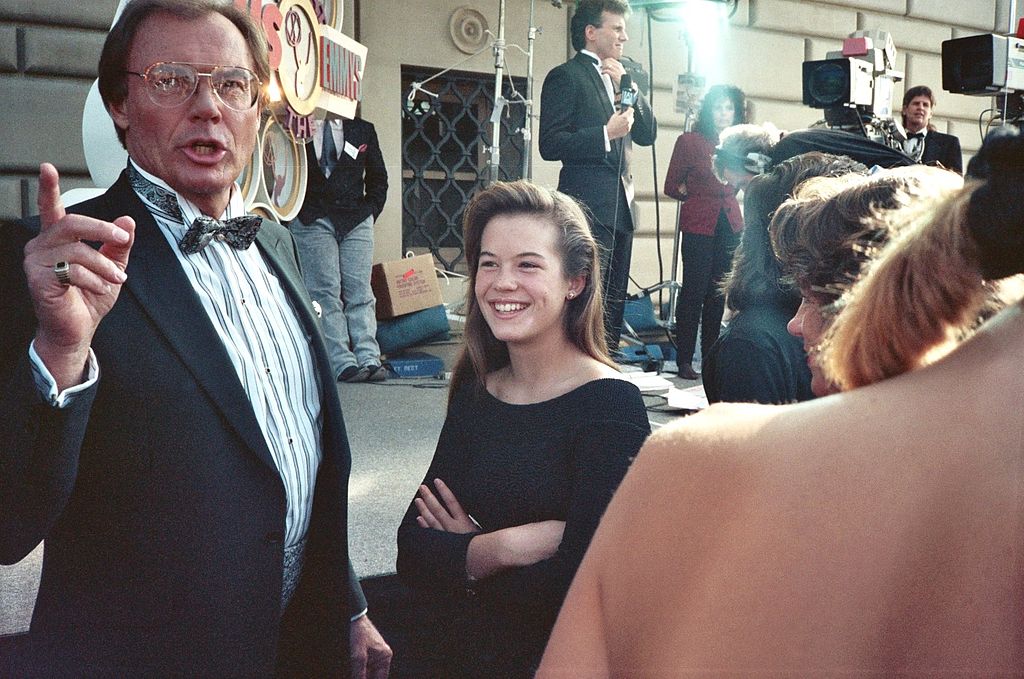 Alan Light, CC BY 2.0, Wikimedia Commons
Alan Light, CC BY 2.0, Wikimedia Commons
14. He Played A Wild West Icon
Long before Gotham called, West made his mark in the Wild West. He guest-starred on multiple ABC Westerns, including Sugarfoot and Lawman amongst others. In multiple TV Westerns, he portrayed none other than the legendary dentist, Doc Holliday. As his career slowly began to take off, however, his personal life went in the opposite direction.
 Warner Bros., Sugarfoot (1957-1961)
Warner Bros., Sugarfoot (1957-1961)
15. He Became A Family Man Again
Uprooting his family from Hawaii and settling them down in Hollywood proved to be a challenge for West. One that, ultimately, not even the future Caped Crusader could overcome. In 1962, his marriage to Dawson crumbled, though West vowed to remain a dedicated father to their children. After all, he was about to become the most famous orphan in history—even if only on TV.
 Gage Skidmore, CC BY-SA 3.0, Wikimedia Commons
Gage Skidmore, CC BY-SA 3.0, Wikimedia Commons
16. He Was Stranded…Again…Kind Of
In spite of his marriage falling apart, West kept grinding away in small roles. He had a minor part in the 1963 comedy Soldier in the Rain alongside Jackie Gleason and Steve McQueen. Then, just one year later, he stepped into a space suit as Colonel Dan McCready in Robinson Crusoe on Mars, commanding a doomed Mars mission.
Great things were just on the horizon.
 Paramount, Robinson Crusoe on Mars (1964)
Paramount, Robinson Crusoe on Mars (1964)
17. He Shared The Screen With Shatner
In 1964, West landed a huge break—or so he thought—in the pilot episode of Alexander the Great, starring opposite William Shatner. In the show, West played Cleander, one of Alexander’s generals. The chemistry between the future Batman and Captain Kirk was, however, not very good. In fact, it was downright terrible.
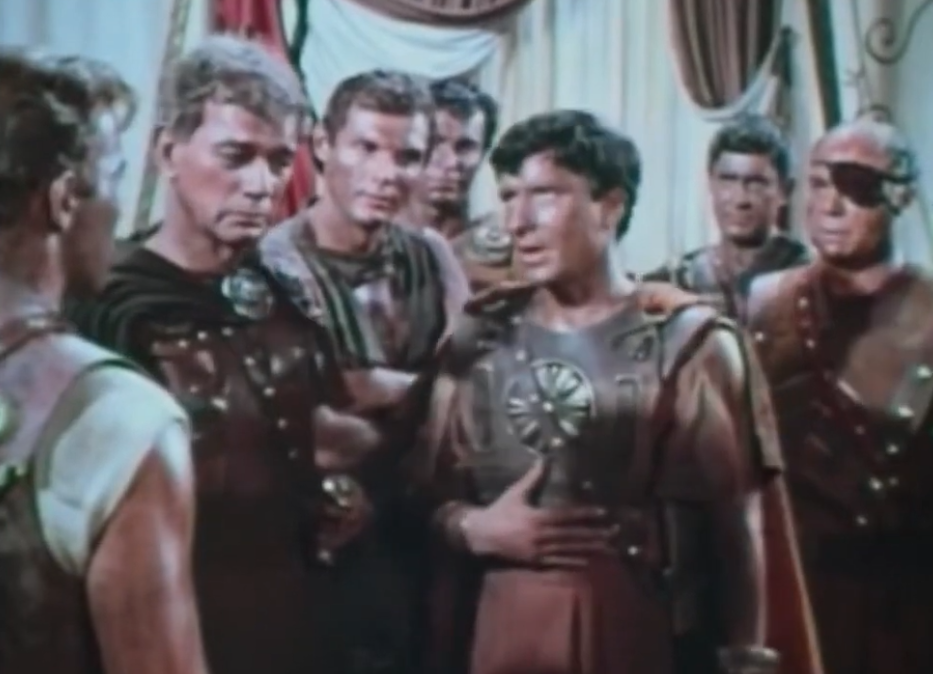 C.B. Films S.A., Alexander the Great (1956)
C.B. Films S.A., Alexander the Great (1956)
18. His Show Resurfaced
The pilot for Alexander the Great was, well, not great and the studio shelved it. But they didn’t throw it out. By 1968, everything had changed. Both West and Shatner had become major TV stars and the network decided to cash in on their fame by releasing some of the footage as a made-for-TV movie.
West was less than impressed.
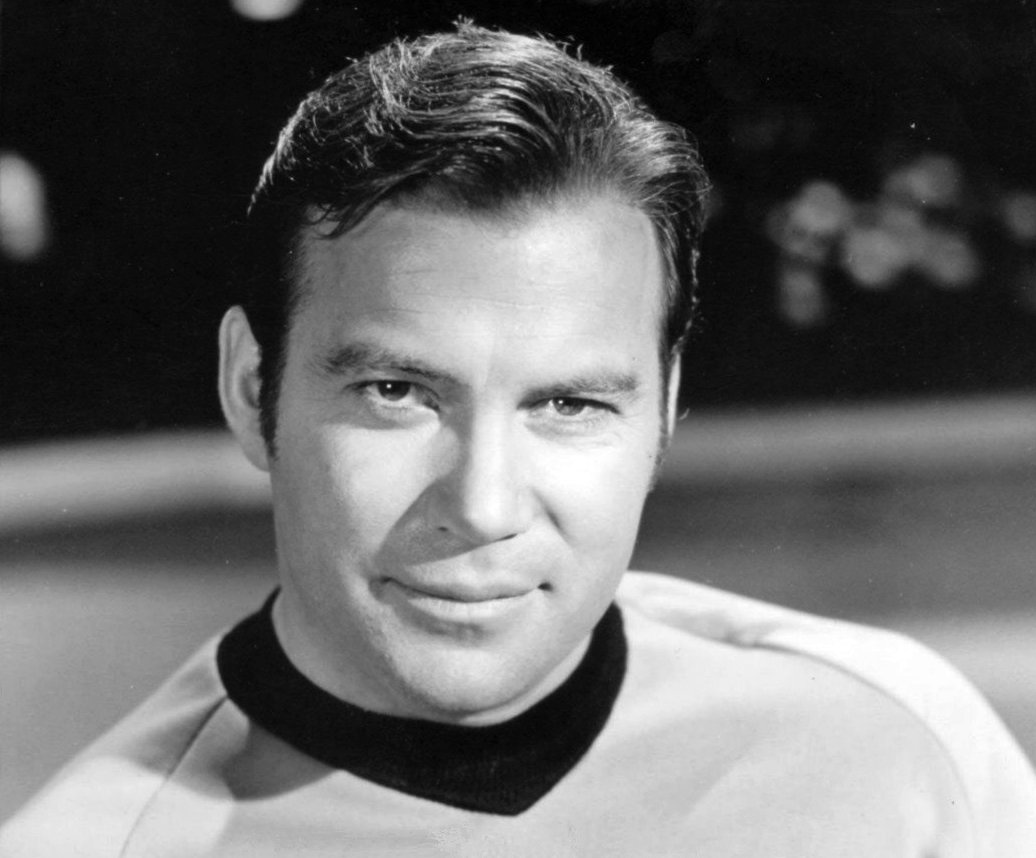 NBC Television, Wikimedia Commons
NBC Television, Wikimedia Commons
19. He Wasn't Surprised
West hadn’t exactly been heartbroken over the fate of Alexander the Great. In fact, he probably would have preferred if it had remained buried. Reflecting on the project years later, West admitted, “It turned out to be one of the worst scripts I have ever read and it was one of the worst things I’ve ever done”.
The best thing he’d over done, however, was right around the corner.
 Selmur Productions, Alexander the Great (1963)
Selmur Productions, Alexander the Great (1963)
20. He Had A “Bat Moment”
While filming the spaghetti Western The Relentless Four, West unwittingly recreated one of the most iconic superhero origin story moments of all time. While riding his horse near a cave, he spooked a colony of bats that flew out of the cave and swirled all around him. At the time, he wasn’t amused, but years later he called it his “bat moment”—a sign of his next big career move.
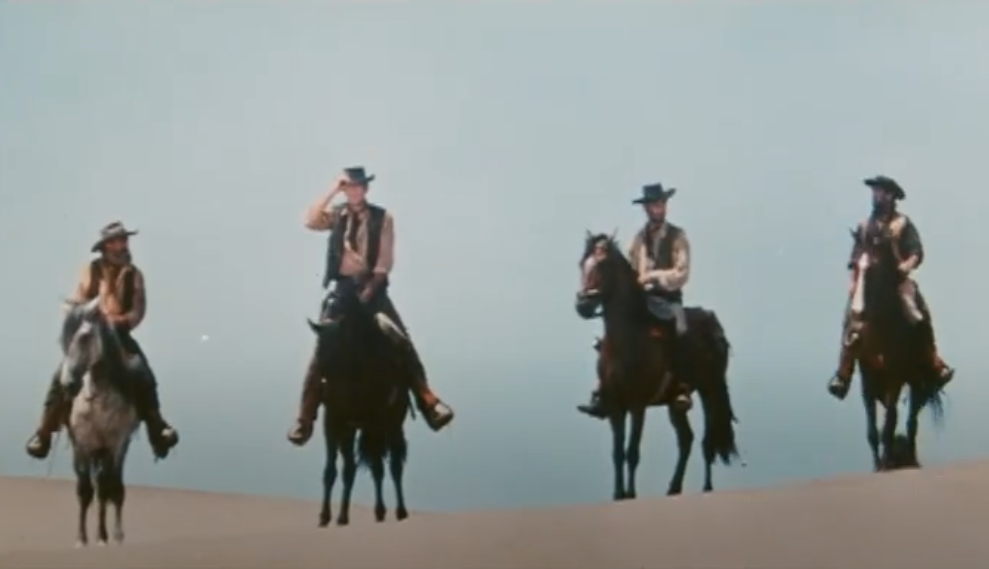 Aitor Films, The Relentless Four (1965)
Aitor Films, The Relentless Four (1965)
21. He Was A Convincing Captain
In a commercial for Nestle Quik, West proved that there was no such thing as small roles; only opportunities for big roles. In the TV spot, he played a suave, spy-like character named Captain Q. His performance was so convincing that he caught the attention of the producers of an upcoming show: Batman.
He was perfect for the role.
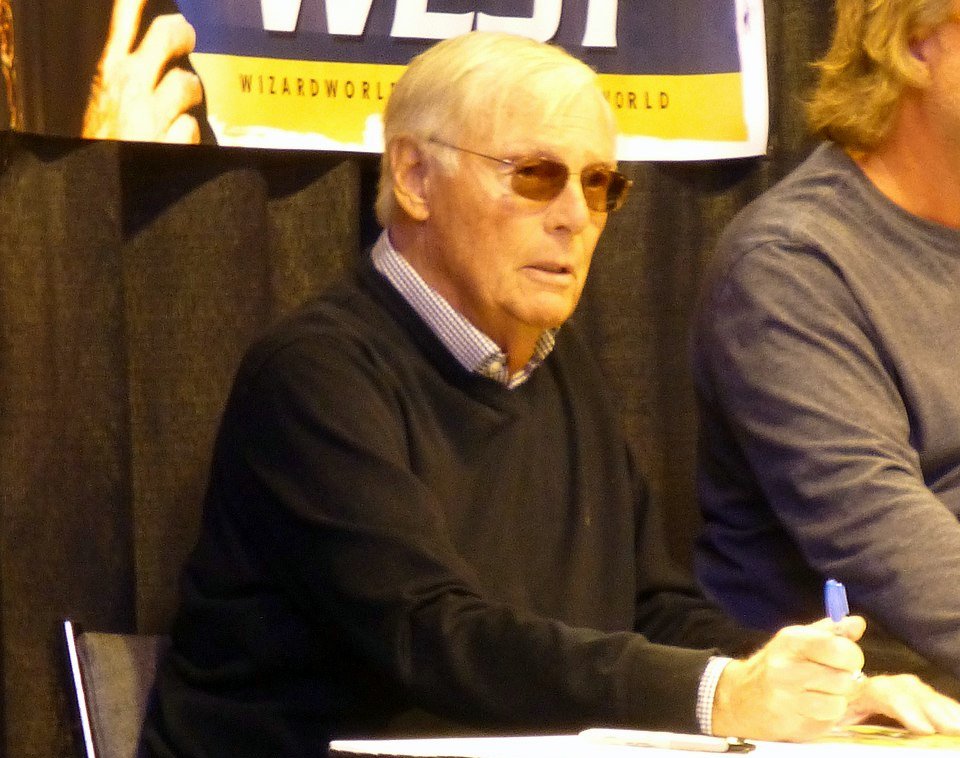 GabboT, CC BY-SA 2.0, Wikimedia Commons
GabboT, CC BY-SA 2.0, Wikimedia Commons
22. He Measured Up
West was perfect for the role of Batman—and not just because of his acting chops. At six feet, two inches tall, West was the exact same height as the Caped Crusader in the comics. It might have seemed like a trivial coincidence, but it gave him a presence that few other actors who donned the cape and mask could match.
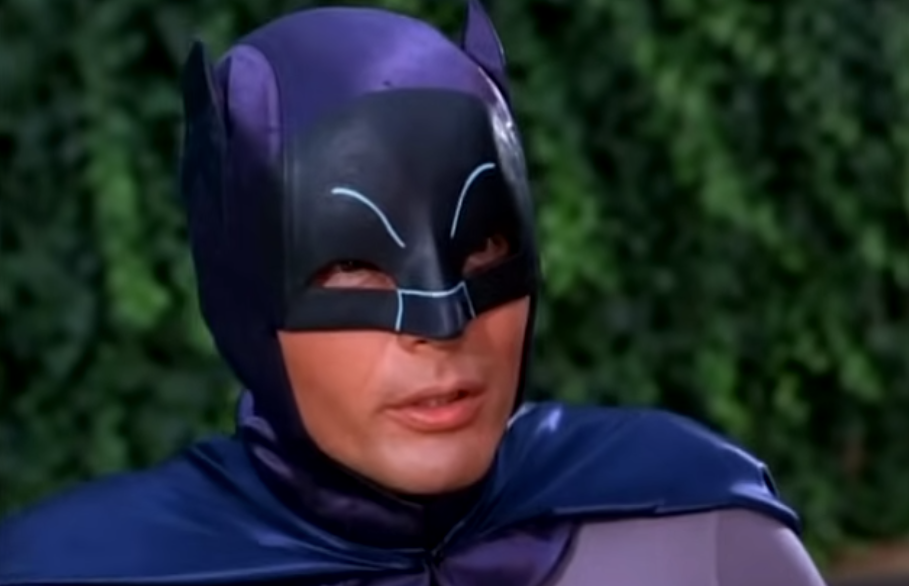 Twentieth Century, Batman (1966–1968)
Twentieth Century, Batman (1966–1968)
23. He Wanted To Show His Face
The early episodes of Batman were so successful that the studio immediately began planning Batman: The Movie. But, to reprise his role for the film, West had one condition: he wanted more screen time as Bruce Wayne. As much as West enjoyed playing Batman on TV, he felt that he was getting “buried in the mask”. Once the studio agreed, he jumped into his Batmobile and sped to the set.
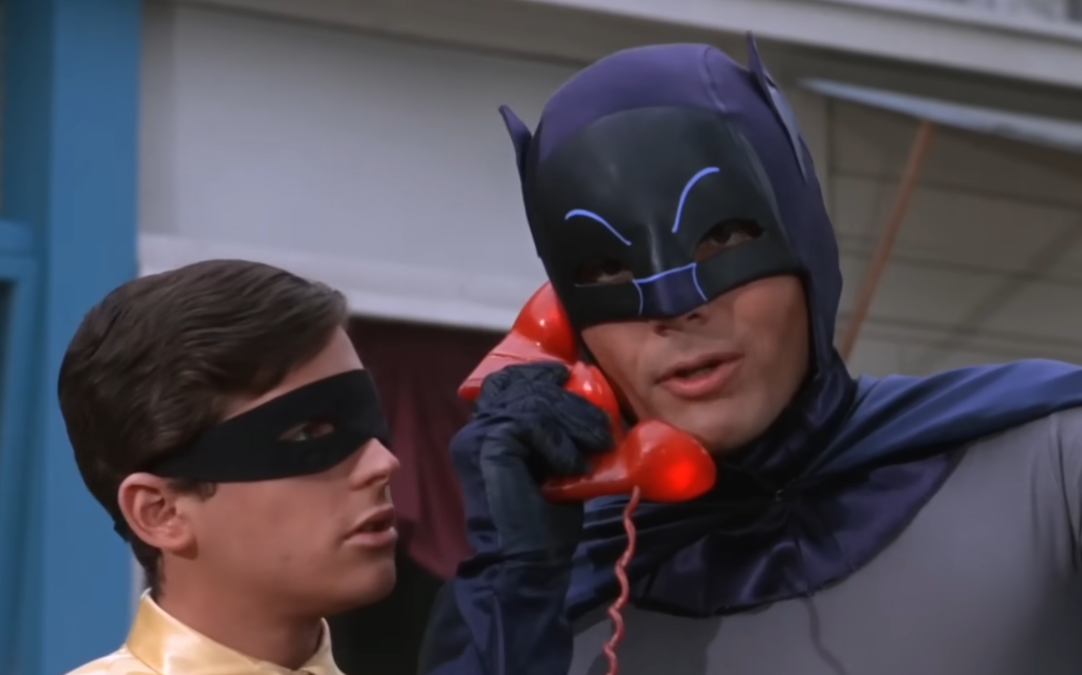 Twentieth Century, Batman (1966–1968)
Twentieth Century, Batman (1966–1968)
24. He Had A Shark Attack
West’s Batman, on TV and in the film, was supposed to be campy and lighthearted. For his part, West leaned into the absurdity of it all. For example, in Batman: The Movie, the West commented that the infamous rubber shark looked laughably (one might say, “comically”) fake. Worse yet, the producers hated the sound that it made when he punched it.
But West had a brilliant idea.
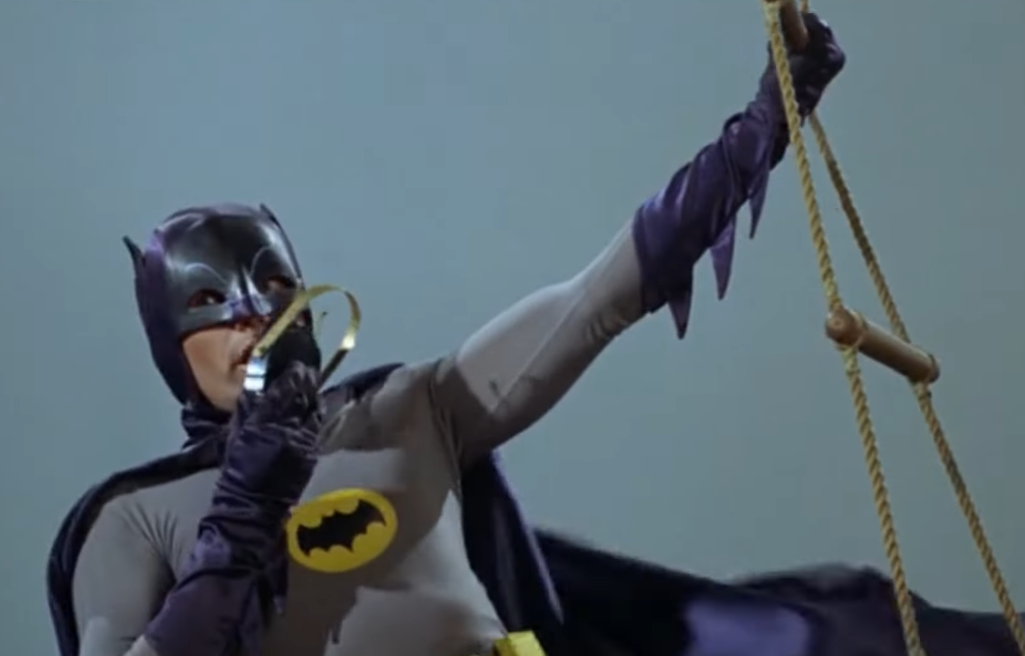 Greenlawn Productions, Batman: The Movie (1966)
Greenlawn Productions, Batman: The Movie (1966)
25. He Leaned Into The Camp
As the producers fussed over the sound effect of West punching a rubber shark, West stayed cool. He told them the sound didn’t matter one bit—because the audience wouldn’t believe the shark was real in the first place. In typical West fashion, he rolled with the absurdity of the situation and made one of the most memorable moments in the film.
He had an instinct for understanding his audience.
 Greenlawn Productions, Batman: The Movie (1966)
Greenlawn Productions, Batman: The Movie (1966)
26. He Defied Gravity
Much like Bruce Wayne, West never had any actual superpowers—but he did have lots of tools. To simulate Batman and Robin scaling a wall, West and his Robin co-star, Burt Ward, filmed on a set tilted at a 45-degree angle. To simulate the effects of gravity, they rigged their capes with invisible filaments. West was so proud of the innovation that he wanted to share it with audiences.
 Twentieth Century, Batman (1966–1968)
Twentieth Century, Batman (1966–1968)
27. He Let Audiences In On The Joke
Ever one to camp-up his character, West came up with a funny idea. As he remembered it, he actually suggested to Batman’s producers that they let the audience see the strings pulling his and Ward’s capes. The subtle wink at the absurdity of the moment was a huge hit with fans who loved the tongue-in-cheek authenticity.
Some of the other stunts, however, were not so funny.
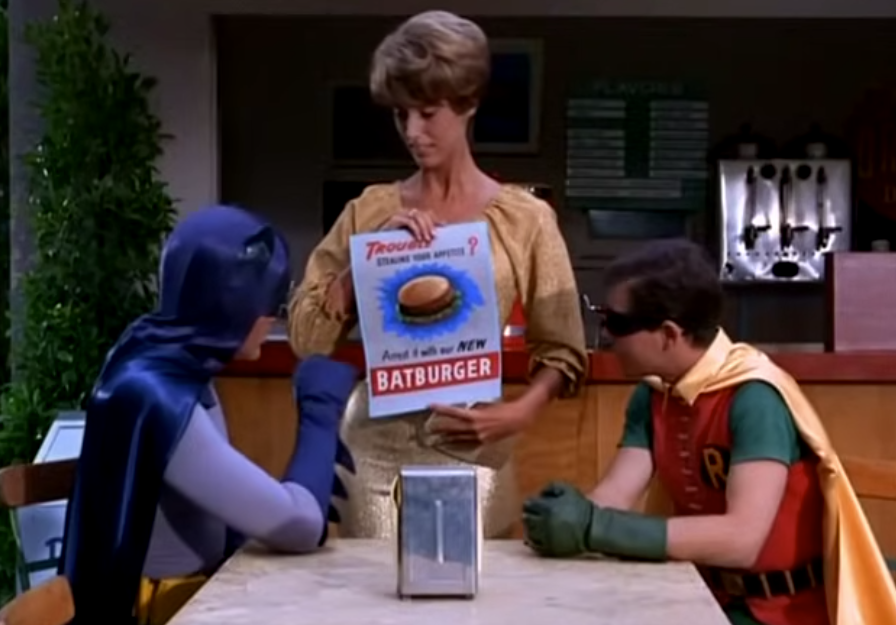 Twentieth Century, Batman (1966–1968)
Twentieth Century, Batman (1966–1968)
28. He Got Burned
Not all of the show’s special effects were quite so delightful and entertaining. West recalled the Batpole launcher—a device that propelled him up the pole—causing him actual pain. The pressurized steam shot directly under his cape and, according to West, almost caused him some burns. That Batpole wasn’t the only potentially lethal prop on set.
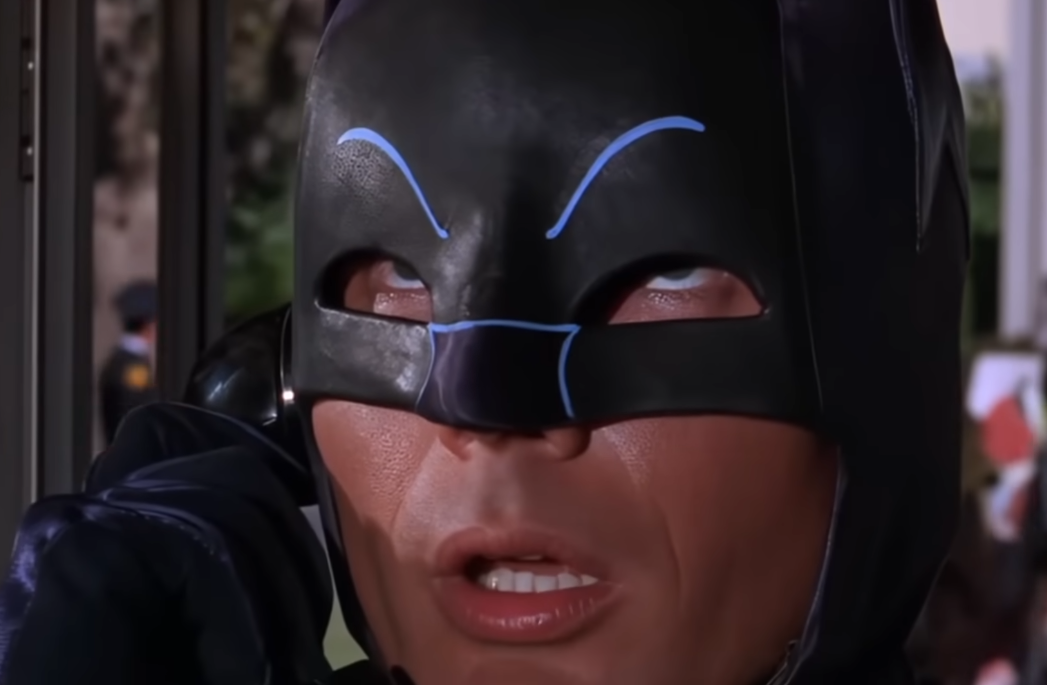 Twentieth Century, Batman (1966–1968)
Twentieth Century, Batman (1966–1968)
29. He Took A Thorny Detour
West’s Batcycle, with the iconic sidecar for Robin, was an audience-favorite. It was also an accident waiting to happen. West later revealed that when Robin’s sidecar jettisoned from the main bike, it didn’t always go where it was supposed to. West and Ward recalled one time it flew into a patch of thorn bushes.
“That was a real pain in the [bum],” Ward said. West had his own pain in the posterior.
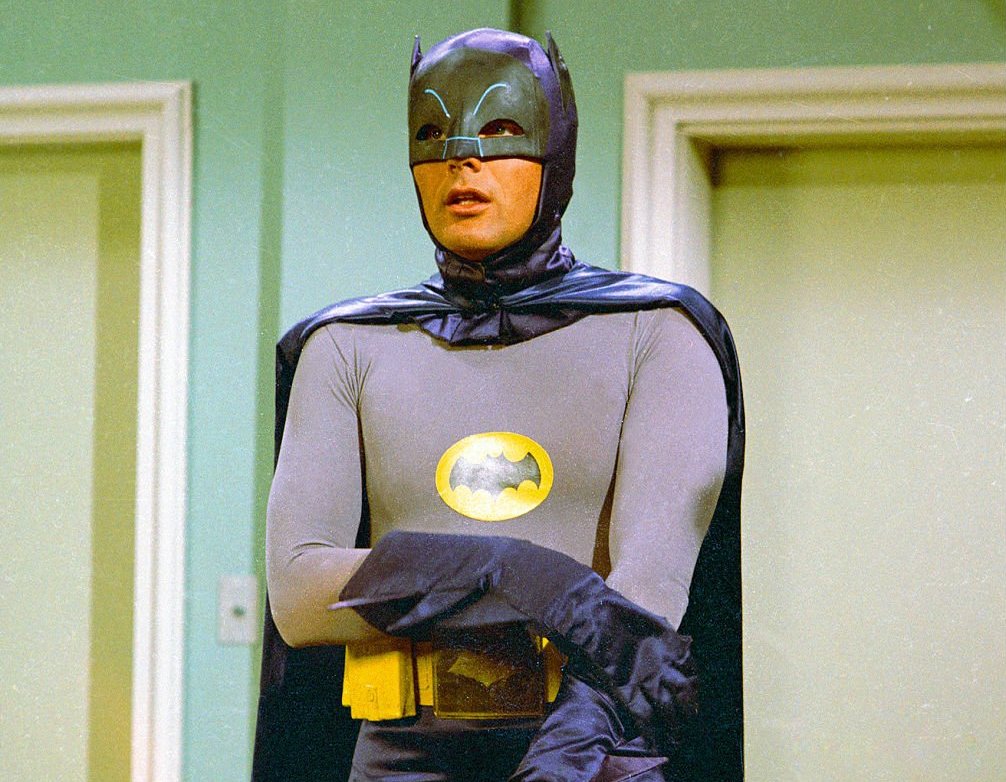 Silver Screen Collection, Getty Images
Silver Screen Collection, Getty Images
30. He Wore “Python Pants”
West’s Batman suits may have looked super, but they were really only super uncomfortable. According to West, the outfits took over 2 million silkworms to produce—though only half of them were “union,” he joked. Ward dubbed his pants “python pants” due to the tightness. “They were itchy,” West added.
Too bad his Batman costume wasn’t more protective.
31. He Got Mobbed
As part of the film’s promotional campaign, West and Ward climbed aboard a tour bus and hit the streets of New York City. The plan was to visit 36 theaters to meet with as many fans as possible. In reality, they only made it to 33 because fans kept swarming the vehicle like it was the actual Batmobile. In fact, West was just discovering how intense the “Batmania” really was.
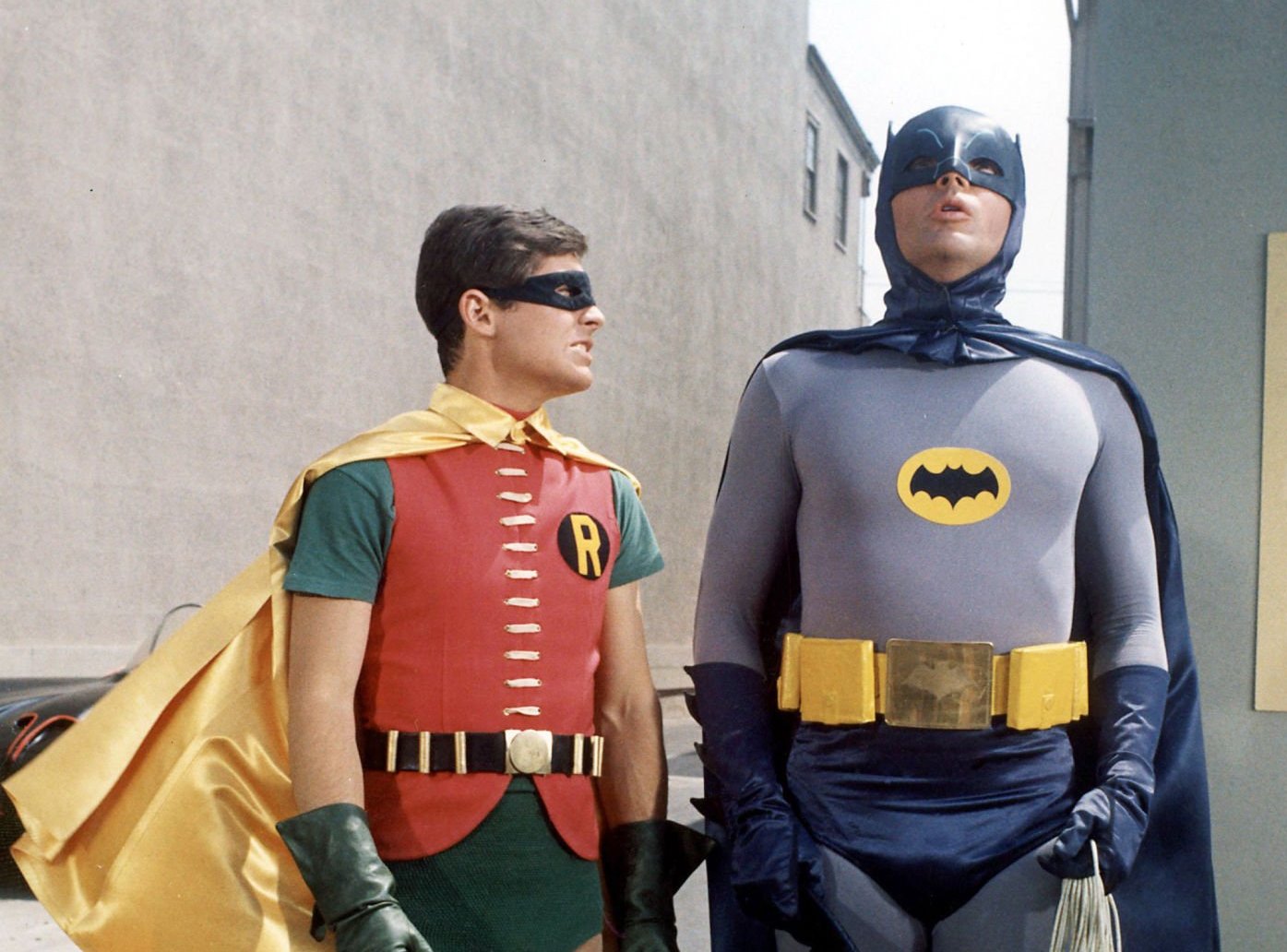 Silver Screen Collection, Getty Images
Silver Screen Collection, Getty Images
32. His Fans Tipped His Bus
West’s fans were so excited to catch a glimpse of him that they actually turned into a dangerous mob. At one point, the fans outside the bus got so unruly, they nearly tipped it over. For a moment, it seemed like Batman and Robin might meet their end not in a fight with The Joker, but in a publicity stunt gone wrong.
Thankfully, West sprung into action like a real hero.
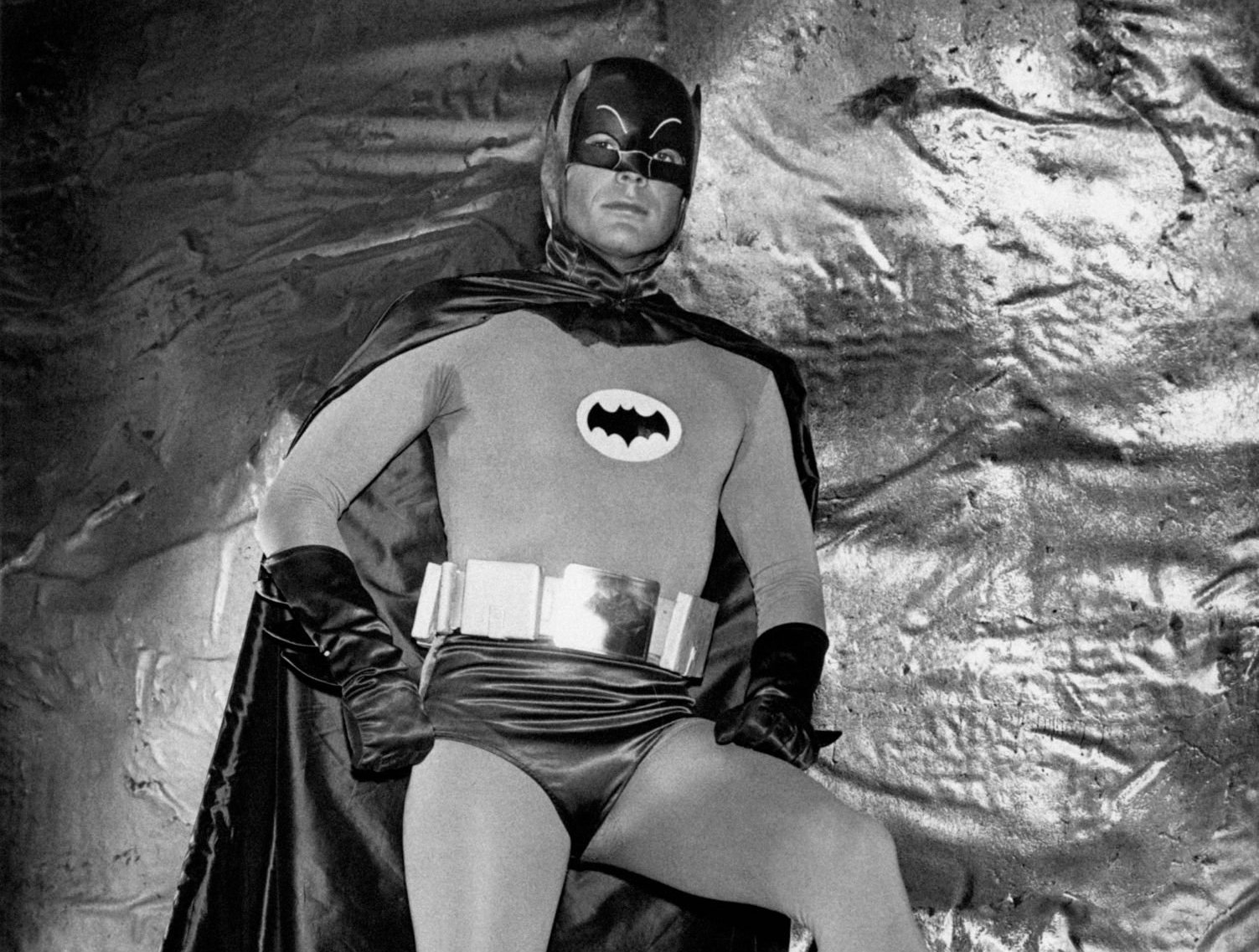 Mondadori Portfolio, Getty Images
Mondadori Portfolio, Getty Images
33. He Led The Charge
On screen, Batman and Robin were a dynamic duo, facing down foes together. In real life, however, it was every man for himself. To avoid the dangerously passionate fans, West always exited the bus first and sprinted through the crowd with heroic determination. Poor Burt Ward, however, was left behind in the stampede to fend for himself.
West jokingly described it like a football play—he ran the play, and Ward took the tackle.
34. He Was Basically King Kong In A Cape
Behind the scenes, West’s relationship with Ward had its ups and downs—such as when West abandoned him to a stampede of fans. While the two shared many laughs, West later reflected that Ward had a habit of embellishing stories. Still, he wasn’t bitter. As West put it, “he made me sound like King Kong”—and honestly, that didn’t sound so bad.
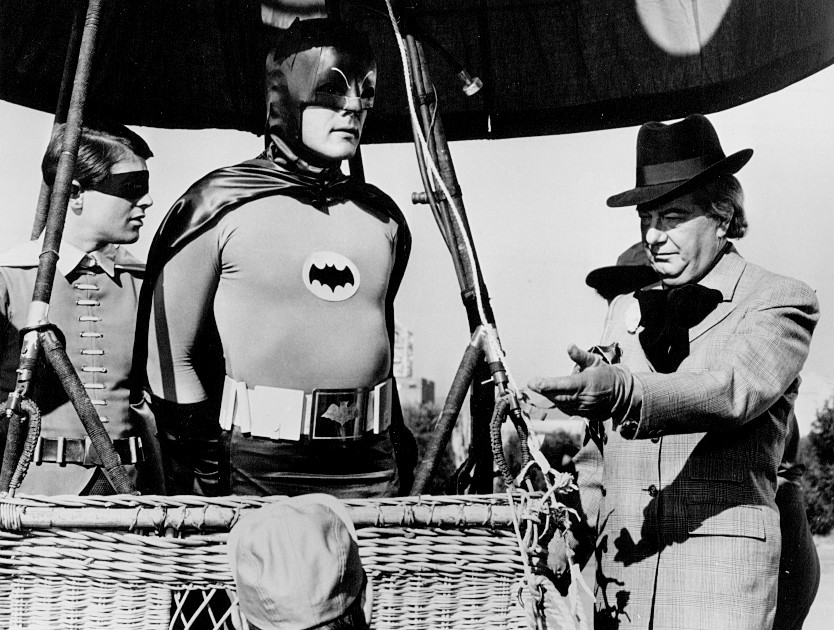 ABC Television, Wikimedia Commons
ABC Television, Wikimedia Commons
35. He Let Fame Go To His Head
The Batman TV series made West a household name—and like many overnight stars, he struggled with the spotlight. “There was a lot of drinking involved, womanizing,” he later confessed. “It’s not easy to deal with that instant fame when you become kind of a rock star”. There were, however, sobering reminders of his humanity.
 ABC Television, Wikimedia Commons
ABC Television, Wikimedia Commons
36. He Couldn’t Actually Fly
West loved that his portrayal of Batman inspired millions of young fans around the world—though, it didn’t always inspire the best behavior. Shortly after the show began airing in the UK, several children were hospitalized for jumping out of windows, trying to imitate West’s Caped Crusader. Horrified at the reports, West quickly filmed a public service announcement in full costume to clarify one crucial point: “Batman can’t fly. And neither can I”.
Fortunately, “Batmania” simmered down before anyone did permanent damage.
 ABC Television, Wikimedia Commons
ABC Television, Wikimedia Commons
37. He Saved Robin
By the end of season three, Batman was struggling in the ratings. In an attempt to cut costs, ABC proposed a shocking plan: eliminate Robin and make Batgirl Batman’s new sidekick. West was horrified at the idea and pushed back against the studio. Unfortunately, ABC turned out to be the villain and cancelled the show altogether.
But West was stuck with Batman, whether he liked it or not.
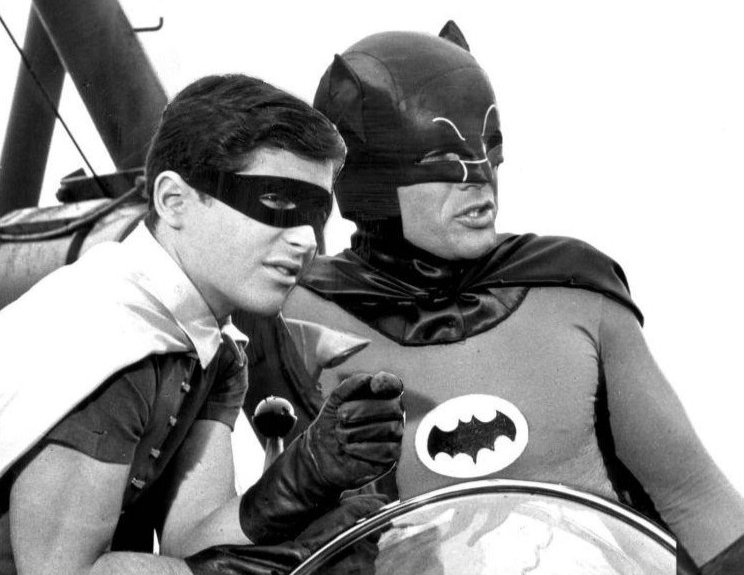 ABC Television, Wikimedia Commons
ABC Television, Wikimedia Commons
38. He Was Typecast
When Batman ended, West took off his costume—but Hollywood could only see the Caped Crusader. Despite his best efforts, West was typecast. His first attempt at reinventing himself came in the 1969 noir film The Girl Who Knew Too Much, where he played a cynical, hard-boiled tough guy. Unfortunately, the film flopped, which only further cemented him as Batman in audiences’ eyes.
There was, at least, one person who saw through the mask.
 United Pictures, The Girl Who Knew Too Much (1969)
United Pictures, The Girl Who Knew Too Much (1969)
39. He Got Married Again
West’s career may have faltered, but his personal life was on steadier footing. In 1970, he married Marcelle Tagand Lear, a fashion designer. They had two children together and stayed happily married for over 46 years. Lear would become the person who helped West find peace in a world that no longer looked like Gotham.
40. He Hit Rock Bottom
Despite finding love again, West struggled with his fame fading. With few acting offers and the shadow of Batman looming over his career, he fell into a deep depression. “I had hit rock bottom,” he later confessed. To cope, he turned to the bottle. It was only through Lear’s love and support that he found the strength to climb out of the Batcave once more.
 Gage Skidmore, CC BY-SA 2.0, Wikimedia Commons
Gage Skidmore, CC BY-SA 2.0, Wikimedia Commons
41. He Had An Epiphany
At first, West blamed the world for his dwindling prospects, convinced that the cape had cursed his career. But then, something changed. “I was bitter when I realized Batman had caused me to lose a lot of roles,” he later admitted. “Then I had an epiphany”. That moment would prove transformative.
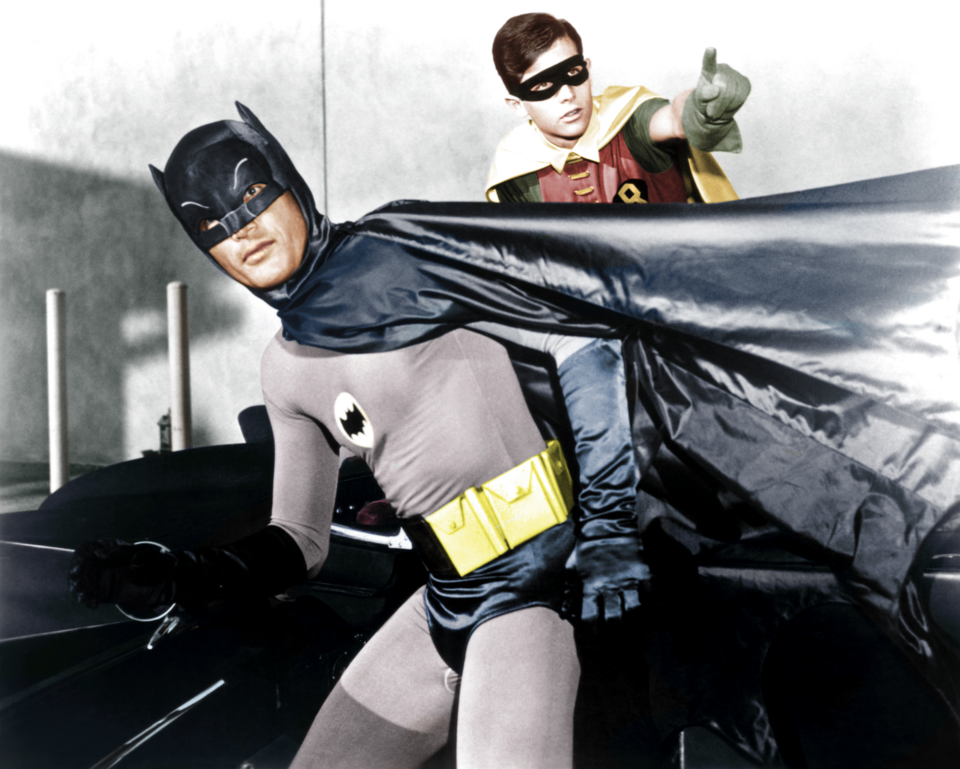 Cassowary Colorizations, CC BY 2.0, Wikimedia Commons
Cassowary Colorizations, CC BY 2.0, Wikimedia Commons
42. He Got His Act Together
West realized that drinking had become his kryptonite (to confuse a metaphor). Fueled by that revelation—and a few stern words from his wife, who wasn’t the type to indulge excuses—he committed to turning things around. “She wasn’t understanding,” he quipped. “She didn’t let me get away with it”.
His new lease on life almost came with another career-defining role.
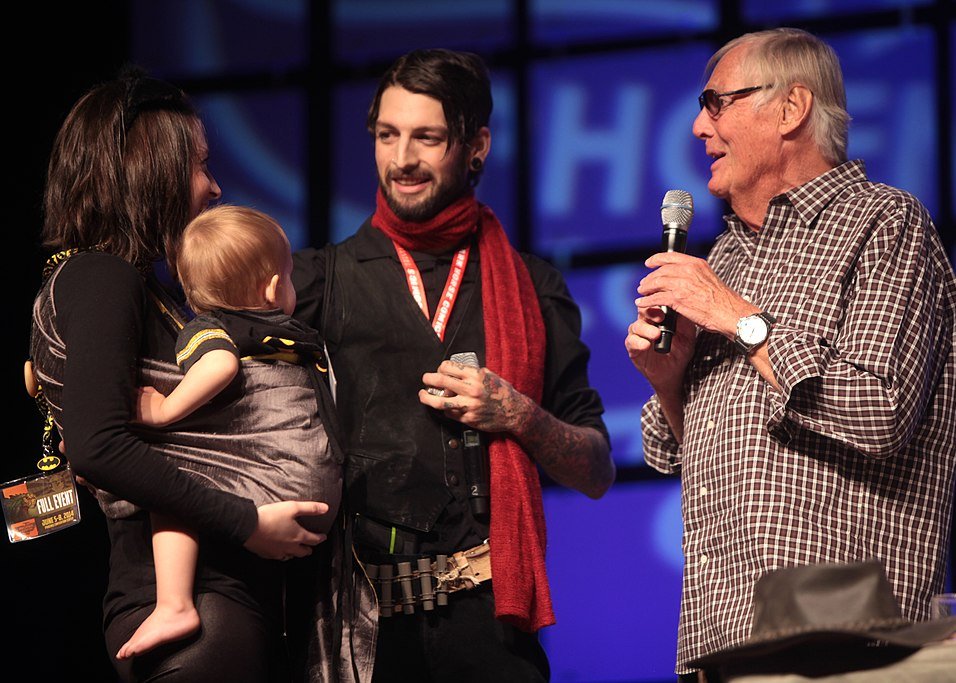 Gage Skidmore, CC BY-SA 2.0, Wikimedia Commons
Gage Skidmore, CC BY-SA 2.0, Wikimedia Commons
43. He Turned Down 007
At the peak of his Batman fame, West had the chance to trade in his cape for a tuxedo. Producer Albert Broccoli considered him for the role of James Bond in Diamonds Are Forever. Ultimately, West turned it down, insisting the part should go to a British actor. Instead of shaking up his martinis, West would be shaking up the county fairs.
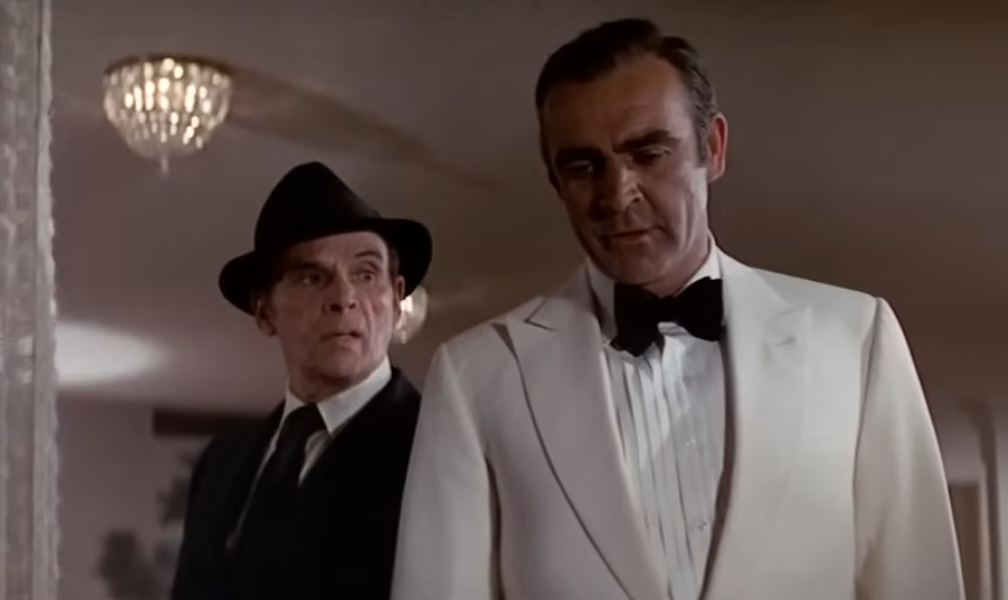 Eon Productions, Diamonds Are Forever (1971)
Eon Productions, Diamonds Are Forever (1971)
44. He Hit The County Fair Circuit
Having come to peace with his Batman alter ego, West leaned into the kitsch. He made public appearances as the Caped Crusader, showed up at wrestling matches, and even got shot out of a cannon at a fair. For a while, it felt like he was becoming a parody of himself—but deep down, he was plotting his comeback.
 20th Century Fox Television, Wikimedia Commons
20th Century Fox Television, Wikimedia Commons
45. He Embraced The Cowl
In 1977, the producers of The New Adventures of Batman asked West to return. At first, he hesitated—it had taken him years to embrace the bat. But the warmth he still felt from fans—and his own fondness for the character—ultimately won him over. West realized that the cowl wasn’t a curse. It was his calling. Plus, his other offers were…kinda bad.
 Warner Bros., The New Adventures of Batman (1977-1978)
Warner Bros., The New Adventures of Batman (1977-1978)
46. He Barely Showed Up For Work
In 1987’s Zombie Nightmare, West scored top billing—but not much else. Despite being the marquee name, he didn’t appear until nearly 45 minutes into the film. Worse yet, according to reports, he kept glancing at the script while filming and wrapped up his scenes in just two days. It was about as clear an indication as any that he had lost interest in anything that didn’t see him riding around in the Batmobile through Gotham.
 Gold-Gems Ltd., Zombie Nightmare (1987)
Gold-Gems Ltd., Zombie Nightmare (1987)
47. He Wasn’t Batman—He Was Catman
West continued to parody himself with flair. In The Fairly OddParents, he voiced a version of himself convinced he was still a superhero. His character in the kids’ show, “Catman”, who was obsessed with cats, was an obvious nod to his Batman days. West gleefully embraced the role with all the campy self-awareness he could muster.
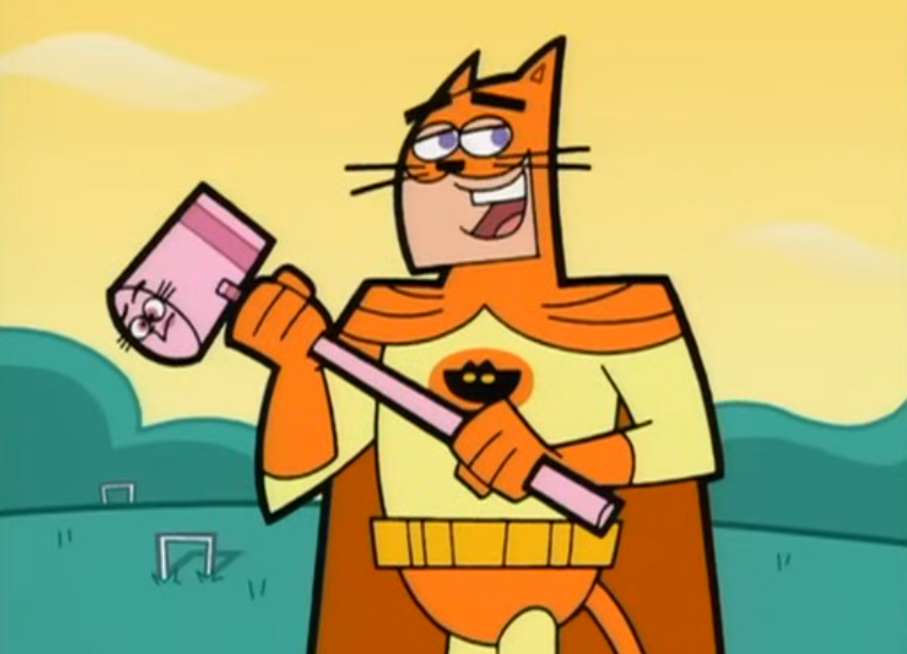 Billionfold, The Fairly OddParents (2001–2017)
Billionfold, The Fairly OddParents (2001–2017)
48. He Became A Mayor (Sort Of)
For a new generation, Adam West wasn’t Batman at all; he was the eccentric Mayor West on Family Guy. The animated role, a cartoonish version of himself, gave West a surprising career renaissance. His character was as absurd as it was beloved, introducing a whole new audience to his signature deadpan charm and unique voice.
Sadly, it would be the last role he truly loved.
https://en.wikipedia.org/wiki/Adam_West
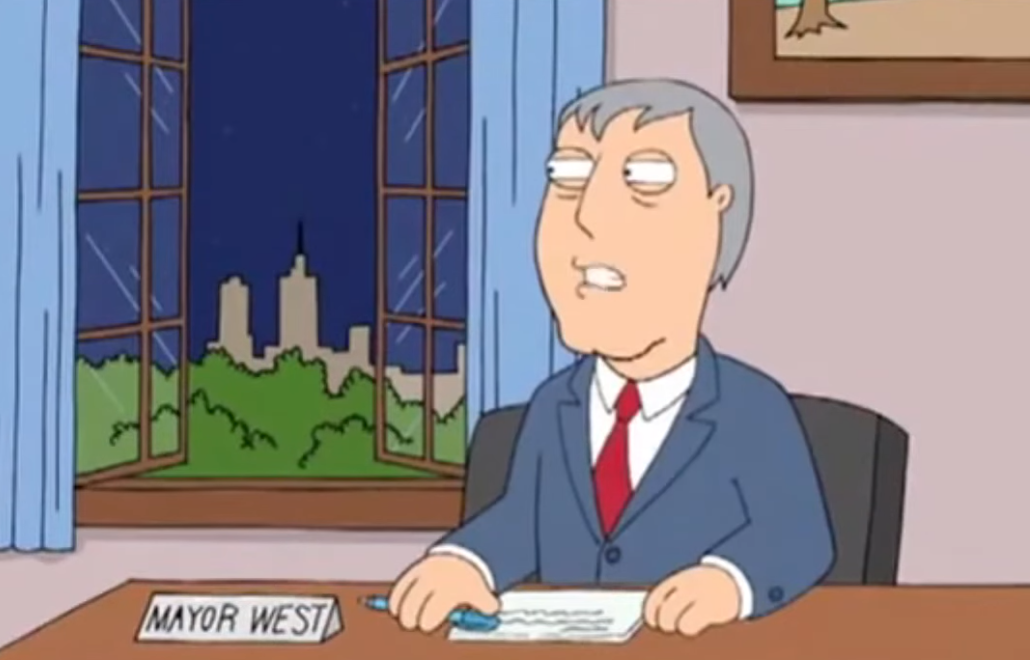 Fuzzy Door Productions, Family Guy 1999-
Fuzzy Door Productions, Family Guy 1999-
49. He Lit Up The Sky
West continued voice acting right up until he passed on June 9, 2017, after a battle with leukemia. But even in the hereafter, he remained a superhero to his fans. In Los Angeles and his hometown of Walla Walla, officials honored him by projecting the Bat-Signal into the sky—one final tribute to TV’s original Bright Knight.
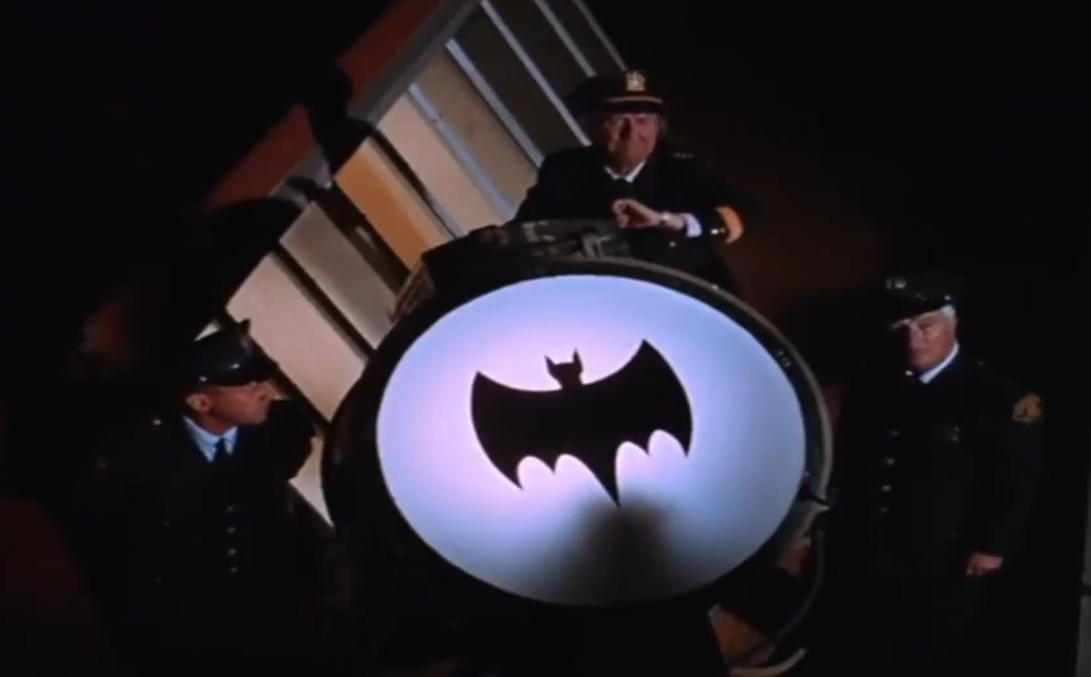 Twentieth Century, Batman (1966–1968)
Twentieth Century, Batman (1966–1968)
50. He Was The Real Batman
After West’s passing, Burt Ward paid tribute to his lifelong friend and co-star: “There are several fine actors who have portrayed Batman…In my eyes, there was only one real Batman—that is and always will be Adam West”. And for millions of fans, the sentiment still holds true.
You May Also Like:
Why So Serious? A Defense Of The Worst Batman Movies
Little Known Facts About Michael Keaton, Tim Burton's Batman



